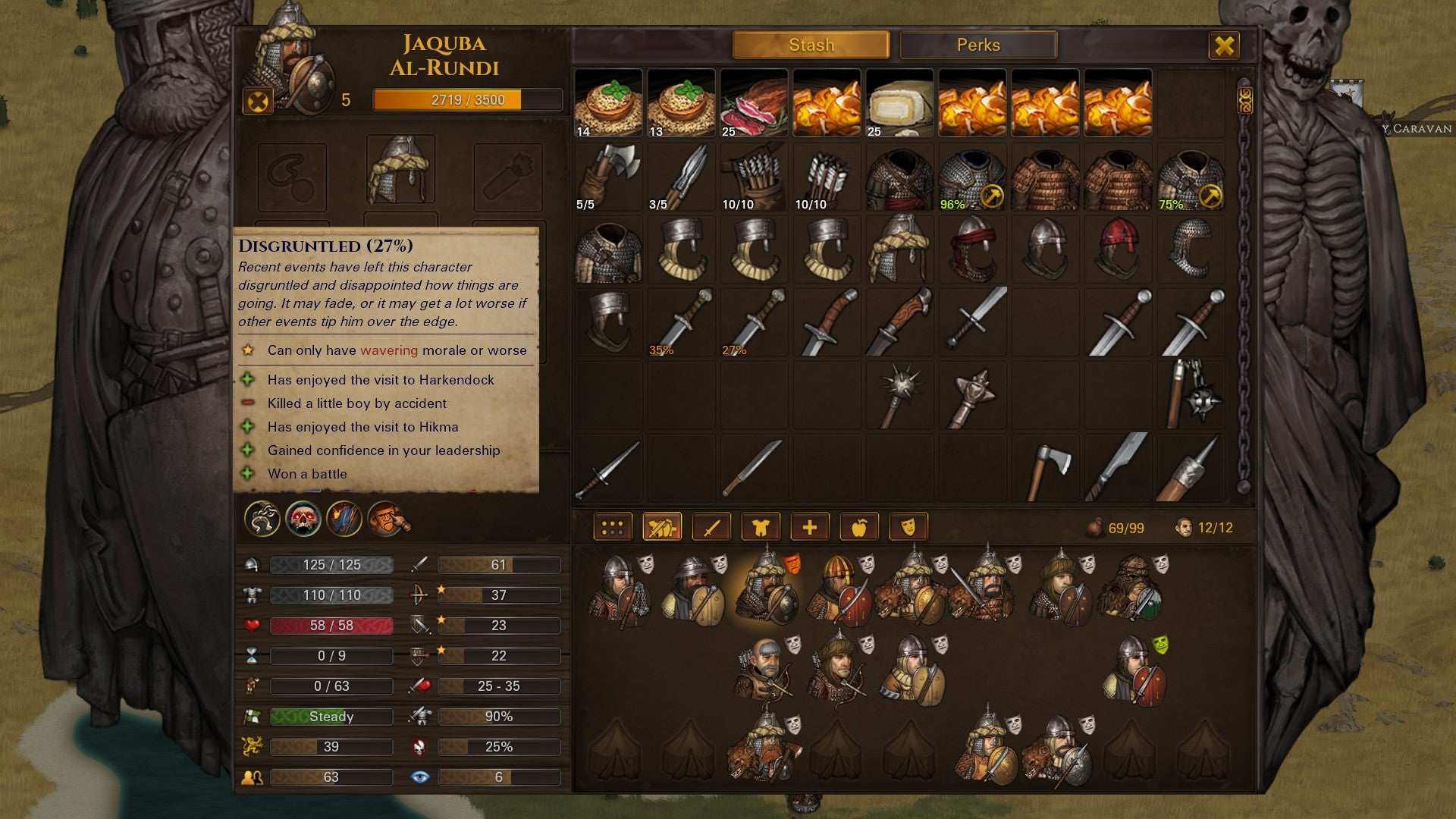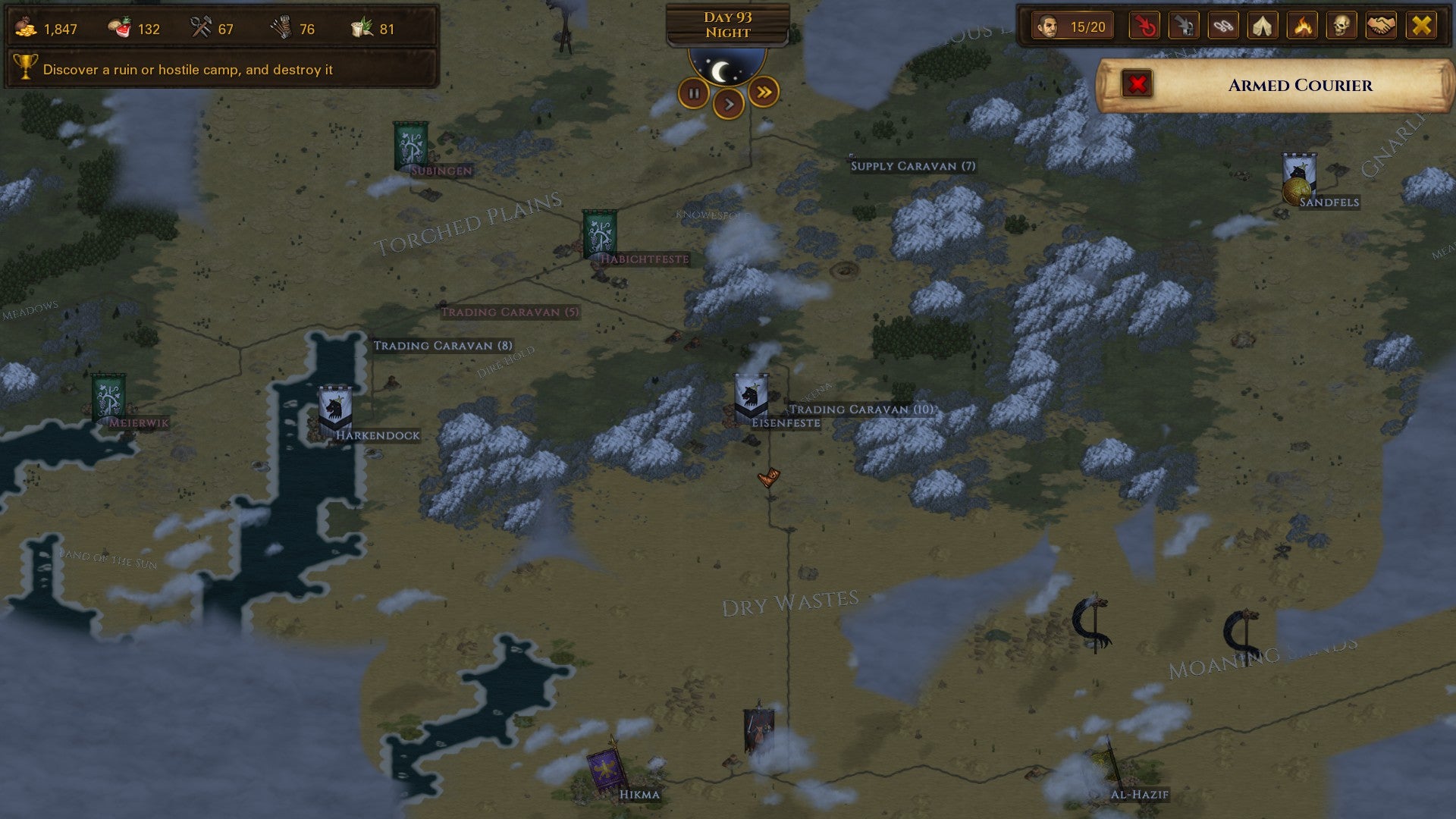But since an update last March looks likely to be its last big one, it’s about time to get over myself and gave it a proper look as a complete package. It’s long overdue, in fact. Although I still struggle to fully enjoy it, Battle Brothers is an unusually good tactical game, and the one to beat for the burgeoning subgenre of mercenary management sims. That’s partly because it sticks so resolutely to its guns. Where Bannerlord faltered by throwing extraneous stuff unrelated to the core combat that should have defined it, and other open world games typically take a varied but shallow “do and be everything” approach, Battle Brothers resists dilution of that core concept. It might not have spread its focus far, but it takes ages to excavate after multiple rounds of DLC (and when you’re not very good at it), because of how much it variegated the details. Overhype Studios have focused on adding more possibilities, with each DLC even taking advantage of the prior ones a little. The more of them you have, the more chance there is of their details bumping into each other, to the point where it would feel weirdly incomplete to go back and play without them. Not that Battle Brothers ever did feel incomplete, mind. It’s simply grown, quite naturally, and wouldn’t fit in those old shoes. Fortunately that doesn’t complicate describing it: you generate a 2D map dotted with towns, villages, and loads of hidden wilderness, and lead a party of little low fantasy medieval dudes around it. Time here passes in regular fashion, consuming food, wages, and often other supplies to repair and reload weapons, and dress wounds. Also moving around are other parties, and if you bump into a hostile one, your wee men will appear opposite them on a hex grid, and you’ll fight in initiative order (ie: fastest characters move first, not XCOM-style team-by-team turns) until one one side is all either dead or fled. Your goal is to pick the fights you can win, and make profit through a combination of selling loot and getting paid. The latter part is handled very well. Each town is owned by a noble house, and will offer one or two contracts every few days. The bulk are straightforward “monsters/bandits are causing trouble, go and kill them” or “escort this caravan to another town”, which sounds a bit dull but it’s the mercenary’s bread and butter, right? What makes them compelling is the context. Each is introduced with some colourful writing, and each is based on real conditions on the map. Those bandits really are causing trouble, as their caravan attacks deprive the town of supplies, driving up prices, and those monsters are scaring people, causing fewer of them to venture out to try signing up to join your band. You can negotiate for better terms too, for more cash total, or a portion upfront, and turn down anything you don’t want. Better though, is the incomplete information. Contracts are loosely rated by difficulty, and higher prices often indicate a rougher ride… but not always. You can make a great payday with caravan escorts in particular (which also provide food for your whole company en route) if nothing attacks. The client is paying just in case, and sometimes they pay over the odds. The inverse is also true. A client can underestimate how hard a fight will be. That cheap-but-easy bandit camp could turn out to be backed by a necromancer, which you should almost certainly run like hell from even if you’re sure your man Hylle could circle around behind the fight and chuck a javelin at the bastard’s head. And maybe he could (he did), but you’re not an adventuring party. You’re a mercenary company. Are we getting paid enough?. Combat, you see, is grubby, risky, and unglamorous. You won’t get one death every ten hours and resurrect them anyway. A rando with a knife whose friends you cut down in droves could lunge forward and decapitate you in one lucky swipe. It’s also exhausting. Even the most skilled fighter will tire if you don’t pace him, especially if he’s in heavy armour, which you’ll probably get as much of as possible for the obvious reason. Zombies are nasty for just this reason; that necromancer knows he can keep reanimating his untiring deadies until your lads plain puff out. You have to know when to say no, when to cut your losses, and when accept a hit to your hard-earned reputation by backing out of a deal. Combat also compares, quite bizarrely, to Dark Souls of all things, because although weapons have statistics, it’s just as important that they enable different types of attack. This gives you more options, and makes more of them worth considering than most games do. Instead of Sword+2 and Sword+3, you weigh up relative damage levels vs utility vs a specific brother’s skills. Spears are accurate but don’t hit hard, but a spearwall move lets you influence where enemies will move. A humble meat cleaver could prove more useful against the undead than an expensive sword, because it lets you explicitly attempt to decapitate. Weapons become not just means to transmit bigger numbers, but tools, in the grim way of real warfare. Your dudes are precious, and expensive to lose even when they’re cheap. Each is named and statted, with a professional background, often a personal trait or two, and varying degrees of potential to be better at stabbing, shooting, avoiding either, enduring, moving faster, or holding their nerve. The best are already soldiers or hunters, but they know it and will cost thousands of gold upfront for their experience and armour. Cheaper ones are common labourers, craftsmen, soft-handed scholars, each of which could still have some use. The lowest expectations are from the homeless, refugees, maimed or otherwise downtrodden, but each can surprise you, either with a hidden talent, surviving long enough to reach their potential, or contributing to an interesting story. Battle Brothers isn’t primarily a story generator. Its narratives vary little from winning or losing repetitive fights, and surviving one of its “late game crises” or not. There’s a curious tension between getting attached to individuals who you’ve invested so much time in slowly levelling up, and treating the party itself as paramount; its entity overrides the value of any one or even handful of members. There are times when, like Wildermyth, you’ll just accept that it’s time for even your favourite and most powerful to take an arrow to the neck. Even more so here, because there’s no legacy, no inheriting children. There is the party, and survival of the whole. It is the attitude of the knife. An oddly upbeat and humourous version, anyway, despite the constant violence and death. In particular, I love that it’s not edgy or grimdark about its grimness or darkness. You can be, well, mercenary, and not only is that accepted, but there are even events where it’s kinder to be a bit of a jerk. But you do get those events. It is full of micro stories, both yours on the battlefield, and the semi-random events that pop up from time to time, unpredictably, and depending on so many things. Where you are on the map. Whether you have enemies. What the party has done recently. How well the last battle went. The time of day, your reputation, your supplies. The backgrounds of your men can throw up stories, like a punch-up breaking out between your southerners and northerners, or a peasant getting into it with your anatomist because he’s carrying a book. That’s basically what the expansions have leaned into. Sure, the map is bigger, and there are loads more armour and weapon options. Instead of the default “getting the band back together” start, your party could be raiders who’ve alienated 80% of the map, or weirdo graverobbers who make experimental concoctions out of monster parts. There are more monsters that present atypical fight structures, and a new end game crisis. But it’s not any one thing that any of its DLC added that has made a difference. It is, just like your party, a different and better whole with the complete set. I wouldn’t be surprised if they’re eventually made inseparable. Battle Brothers is meant to be replayed, you see. I’m glad it only recommends, and does not mandate (sigh) “ironman” mode, which would kill it stone dead for me. There are even lower difficulties. But I recognise it says that because it’s meant to be tried again, not to waste your time or make some stupid empty point about being “hardcore”, but to see all its possibilities. All the permutations you won’t realise until you chance into something you haven’t combined before, like when a group of ifrit attacked some nomads I was hired to oust, creating a three-way fight that suddenly became four-way when our dead started to rise and attack everyone, or the magical bird I found in a secret structure while skirting a week-long path to a two day delivery because I’d raided too many caravans. Sometimes you have to accept that the fight is lost, and it’s time for the party to end. You have to learn to lose. Most mercenary companies will, after all. I remain kind of terrible at Battle Brothers. I don’t know that I will ever fully love it, but it’s a game that knows what it’s about, and a rare one whose additions only bring that flavour out even stronger. If nothing else, I admire that a great deal.



